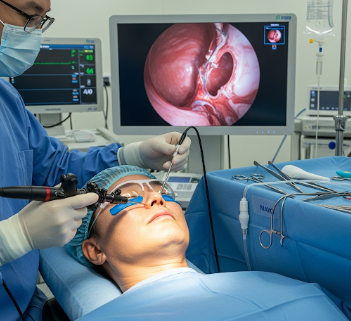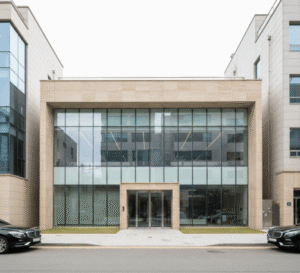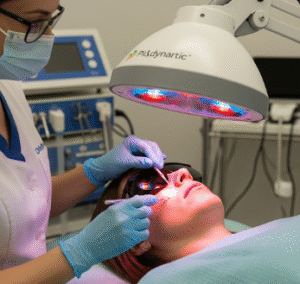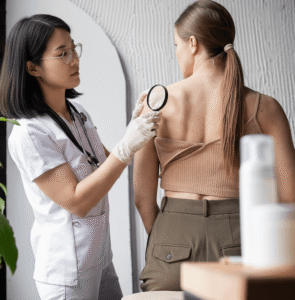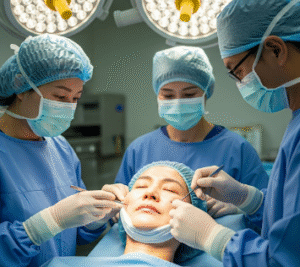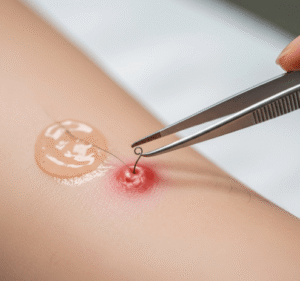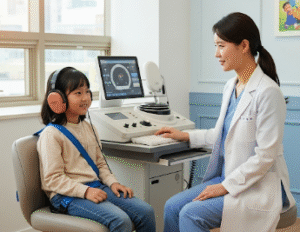Overview
Endoscopic sinus surgery is a minimally invasive surgical procedure designed to treat chronic sinus infections, nasal polyps, and structural problems in the nasal passages and sinuses. Unlike traditional open surgery, this technique uses a small camera (endoscope) inserted through the nostrils, allowing precise treatment without external incisions.
In South Korea, endoscopic sinus surgery is performed in advanced ENT (Ear, Nose, Throat) centers with high-definition endoscopic systems and experienced otolaryngologists, ensuring safe and effective treatment. Korea is renowned for state-of-the-art surgical techniques, minimal recovery time, and high success rates for sinus procedures.
What is Endoscopic Sinus Surgery?
Endoscopic sinus surgery involves the use of a thin, flexible tube with a camera and surgical instruments to remove blockages or diseased tissue in the sinuses. It is primarily used to:
- Treat chronic sinusitis not responding to medications
- Remove nasal polyps or tumors
- Correct structural issues such as deviated septum or narrow sinus openings
- Improve sinus drainage and airflow
- Reduce the frequency of recurrent sinus infections
The procedure is less invasive than traditional surgery, reduces scarring, and allows faster recovery.
What are the benefits?
Endoscopic sinus surgery provides several advantages:
- Minimally invasive → no external incisions, reduced bleeding, and less tissue damage
- ➤ Improves sinus drainage → reduces infections and congestion
- ➤ Restores normal nasal function → better breathing and smell
- ➤ Reduces the need for repeated medications
- ➤ Shorter recovery period → patients usually resume normal activities within 1–2 weeks
- ➤ High-precision surgery in Korea → advanced endoscopic tools allow removal of diseased tissue without damaging healthy structures
Procedure Details
1) How should I prepare for Endoscopic Sinus Surgery?
Preparation ensures a safe and successful outcome:
- Medical evaluation → blood tests, imaging (CT scan), and physical examination of sinuses
- Medication review → discontinue blood thinners or certain anti-inflammatory drugs as advised
- Fasting instructions → no food or drink 6–8 hours before surgery if general anesthesia is used
- Nasal hygiene → saline sprays may be recommended to clear mucus
- Preoperative consultation → discuss anesthesia, procedure steps, and expected recovery with your ENT surgeon
2) What happens during the procedure Endoscopic Sinus Surgery?
The procedure typically lasts 1–3 hours, depending on the complexity:
- Anesthesia → local or general anesthesia is administered
- Endoscope insertion → a small camera is inserted through the nostrils for visual guidance
- Tissue removal → nasal polyps, inflamed tissue, or obstructions are carefully removed
- Sinus widening → blocked sinus openings are enlarged to improve drainage
- Inspection and closure → surgical area is checked for bleeding, and small nasal packing may be placed if needed
In Korea, surgeons often use high-definition endoscopes and precision instruments to minimize tissue trauma and improve postoperative outcomes.
3) What happens after an Endoscopic Sinus Surgery?
- Immediate recovery → monitored in a recovery area for a few hours after anesthesia
- Pain and discomfort → mild pain, congestion, and minor bleeding are common
- Hospital stay → usually outpatient or 1-day admission for complex cases
- Nasal care → saline rinses and follow-up visits to remove crusts or packing
- Gradual return to activity → normal activities are typically resumed within 1–2 weeks
Risks / Benefits
Potential Risks:
- Mild to moderate nasal bleeding
- Infection or delayed healing
- Scar tissue formation in the sinus
- Rare complications → cerebrospinal fluid leak, vision changes, or injury to surrounding structures
Key Benefits:
- Relief from chronic sinus infections and congestion
- ➤ Improved breathing, sense of smell, and overall quality of life
- ➤ Minimally invasive with less recovery time
- ➤ Reduces dependence on long-term medication
- ➤ Highly successful outcomes in Korea with advanced surgical techniques
Recovery and Outlook
- Initial recovery → mild congestion and discomfort for 1–2 weeks
- Full recovery → sinuses typically heal within 4–6 weeks, allowing normal breathing and sinus function
- Long-term outcomes → chronic sinusitis, nasal polyps, and other issues are significantly reduced
- Follow-up care → regular ENT visits ensure proper healing, removal of crusts, and prevention of recurrence
South Korea’s advanced ENT centers provide postoperative care, nasal irrigation protocols, and follow-up imaging to ensure optimal long-term results.
When To Call the Doctor
Seek medical attention immediately if you experience:
- Heavy nasal bleeding or clots
- ➤ Severe facial pain or swelling
- ➤ Fever or signs of infection
- ➤ Persistent nasal obstruction or unusual discharge
- ➤ Vision changes or severe headaches
Early consultation ensures timely management of complications and successful recovery.
Best Korea Option / Process
South Korea offers world-class ENT care for endoscopic sinus surgery:
- High-definition endoscopic equipment → precise and minimally invasive surgery
- Expert ENT surgeons specialized in sinus and nasal surgery
- Comprehensive diagnostic and surgical packages → including pre-op imaging, surgery, and post-op follow-up
- Short hospital stay and fast recovery protocols
- Patient-focused care → multilingual support and international patient services
Patients choosing Korea for endoscopic sinus surgery can expect high safety, excellent outcomes, and improved quality of life, making it one of the best destinations for sinus surgery in Asia.

